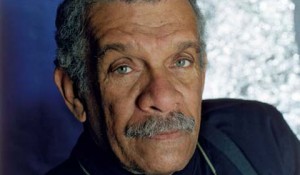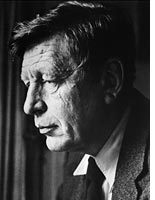
This morning I told Sam I was going to be writing a post on Derek Walcott. “I don’t understand why he’s considered so great,” he said. “With the exception of that one poem about the birds, the poems of his I’ve come across have seemed so specifically about the Caribbean. What does he have to say to an ordinary guy living in Denver?” Sam is one of the most avid readers of poetry I know, actually much more skilled at it than I, so his question warrants a serious attempt at a response.
I’ll begin by mentioning another poet altogether: Three years ago I had the opportunity to meet Mark Strand. For those of you who don’t know, Mr. Strand is one of America’s preeminent poets. Born in 1934, he is a member of what I would call a golden generation of American poets born between 1920 and 1940 which includes W. S. Merwin, Philip Levine, James Merrill, Sylvia Plath, Richard Wilbur, John Ashbery, A. R. Ammons, Amy Clampitt, Galway Kinnell, Adrianne Rich, and Charles Simic, all of them born between 1920 and 1940. There were great poets before them, and there are many fine younger poets at work now, but something in America’s water between the two world wars yielded an unprecedented effulgence of poetic genius.

At 75, Mark Strand radiated upon those of us gathered his pronounced Clint Eastwood brand of handsomeness, the kind that insists on reminding you of its owner’s age. How much trust does one allot for the work of a tall handsome poet? On the one hand, physical beauty makes no difference at all. Only the words matter, the words, how they are arranged, and to what end. On the other hand, one can’t help wondering what tangled vines it helped clear for him from the universal jungle’s narrow and precarious path. As if to illustrate, he told a personal anecdote that could not have happened to just anyone. He told a story about meeting Auden:
During Strand’s time as a student at Antioch University, W. H. Auden visited the campus, and the privilege fell to him to usher the great poet around. At the end of the day, Auden, Strand, his wife, and a friend went to the friend’s apartment for a glass of brandy. Only problem, the friend had but three glasses. It was decide that Wystan Hugh and Mark would share a glass. The brandy was poured. Auden took a sip. Then, from the opposite side of the glass, Mark took a sip. Auden rotated the glass to sip form where Mark’s lips had been. Mark turned the glass, seeking an unsullied portion of the rim, whereupon Auden again placed his lips on the same coordinates. And so it went, Auden’s lips pursuing, Strand’s pursued. All around the glass.
A story like this holds several thrills. First, there is the delight in the way the mind makes meaning. It is the delight a poet takes in raising the mundane to the level of, if not truth, than at least wit. Marvelous, isn’t it, that something as archetypal and untamed as the erotic chase can be channeled into a few drinks from a brandy glass. The world seems better for this, more beautiful. Or at least more manageable.

Then there is the pleasure of its subject: It is a story about Auden for God’s sake! One of my first poetic idols. So this is how, in one instance, the great man operated without paper and pen. And there I was, mere feet away from someone who had known him. My narcissism positively quivered in the reflected glow.
Finally, it was Mark Strand, one of America’s finest, doing the telling. Mark Strand, to whom Harold Bloom gives over a loving section of his new book, The Anatomy of Influence. The story humanized him, as it humanized Auden. It humanized him, but how glamorously! Before winning the Pulitzer Prize, before becoming Poet Laureate, this man shared an escapade, if only small-scaled and symbolic, with the man who wrote The Shield of Achilles. Me? Today, I ate an egg sandwich.
I asked Mr. Strand which poets he loved the most. “Derek Walcott.” Not a moment’s hesitation. In his opinion, Derek Walcott is the greatest living poet in English (a position that I would argue once belonged to Auden). “His use of language is…Shakespearean.”
 By coincidence, I had recently purchased Walcott’s Selected Poems (2007). I had sniffed at it, read some poems, read lines or stanzas from others. But, taking Strand’s cue, I decided to dive in and read it from cover to cover.
By coincidence, I had recently purchased Walcott’s Selected Poems (2007). I had sniffed at it, read some poems, read lines or stanzas from others. But, taking Strand’s cue, I decided to dive in and read it from cover to cover.
I was not a Walcott virgin. Back in 1992 or 1993, after he won the Nobel Prize, I went straight to the Denver Public Library and checked out his volume, The Fortunate Traveler (1981). I copied out some of the poems (I’ve always loved doing this), including what became, and remains, one of my favorites, “The Season of Phantasmal Peace”. It is the “poem about the birds” Sam cited as the exception to his general impression of Walcott’s work. Not surprising. It is one of the high points of poetry in English. It begins: “Then all the nations of birds lifted together/the huge net of the shadows of this earth/in multitudinous dialects, twittering tongues,/ stitching and crossing it.”
When I got to the section from The Fortunate Traveler in Selected Poems, I discovered that the very first poem in this section, entitled “Piano Practice”, is dedicated to none other than Mark Strand! At one and a half pages, it is what would be for most poets a poem of medium length. For Walcott it is positively concise. It begins with three wonderful lines: “April, in another fortnight, metropolitan April./A drizzle glazes the museum’s entrance,/like their eyes when they leave you, equivocating spring!”
On a hunch, I reached for my copy of Strand’s New Selected Poems, flipped through the pages. I knew it had to be there. Sure enough. There, on page 243, from his 1998 volume, Blizzard for One, was, in seventeen lines of iambic hexameter, “The View”, for — Derek Walcott.
More on Walcott, Strand, Auden, and a go at Sam’s question in my next post.

